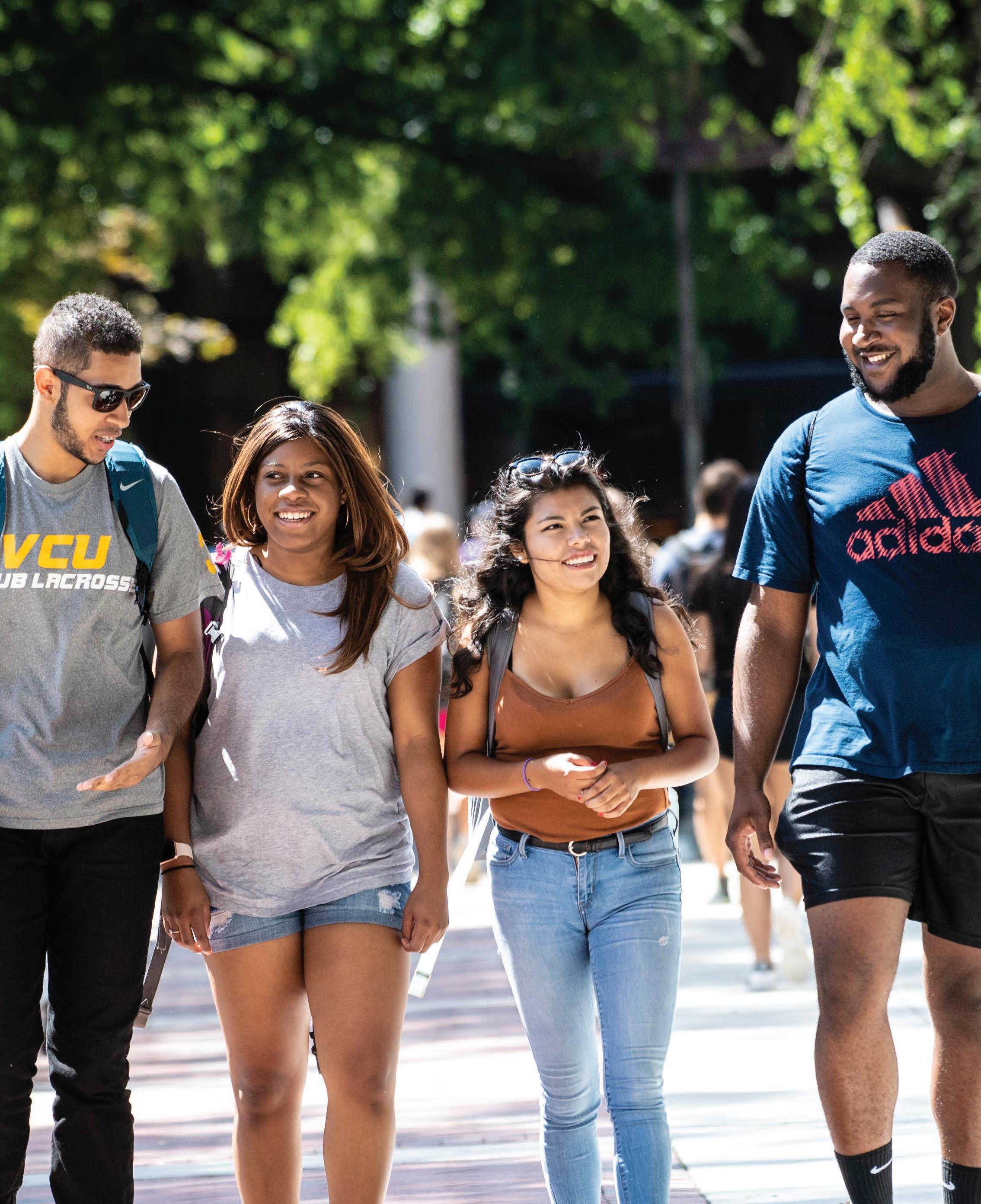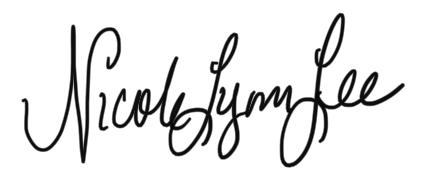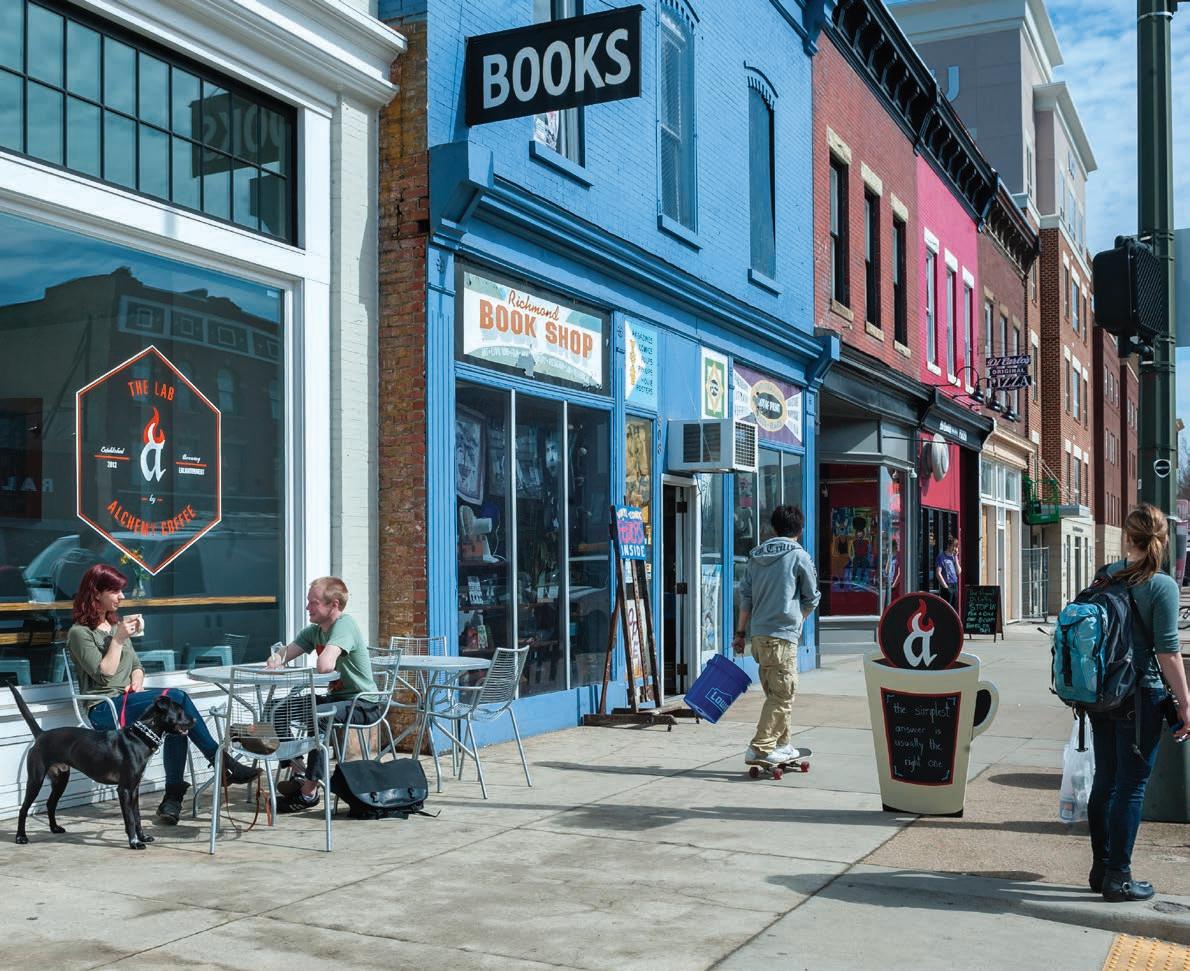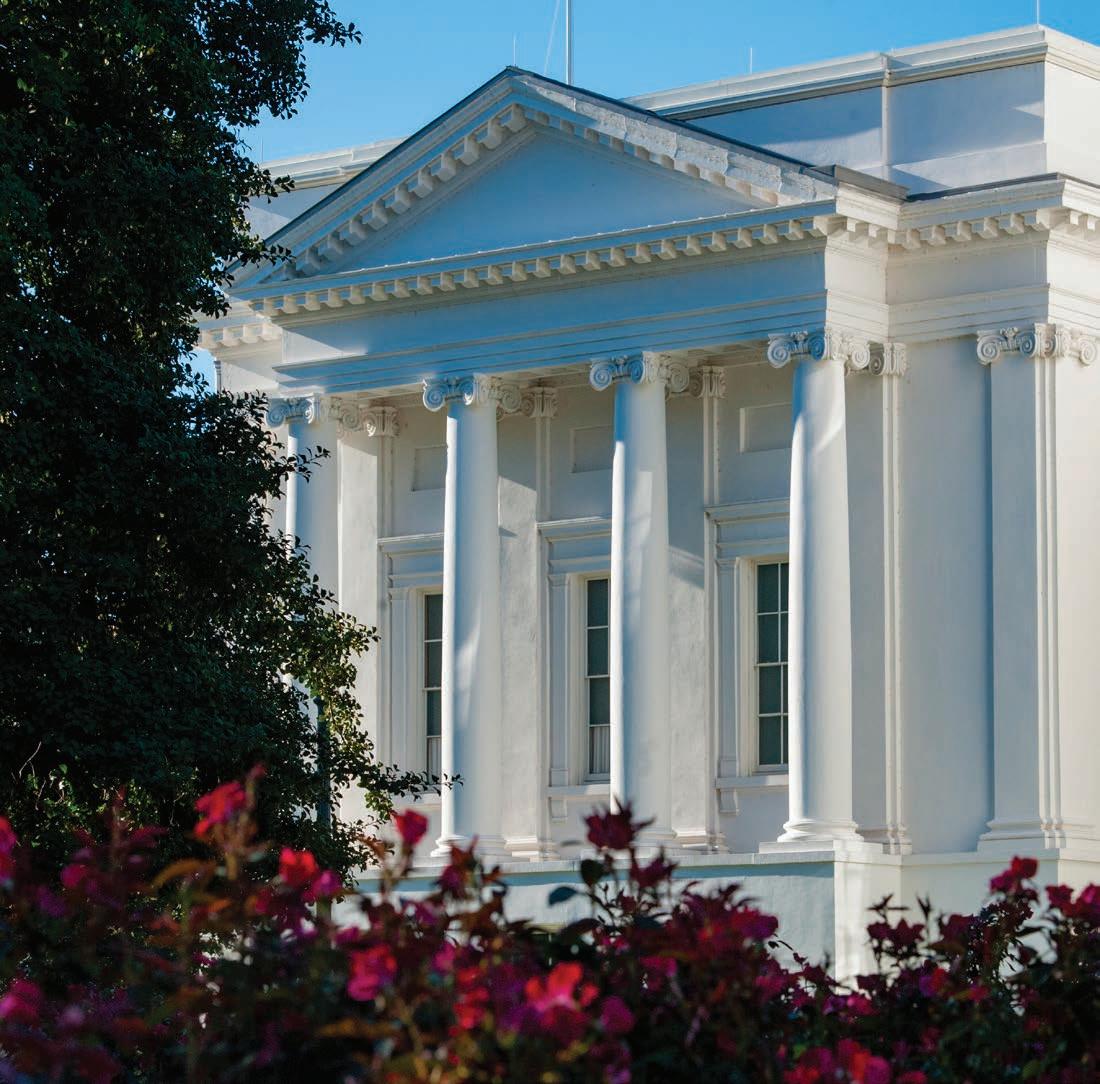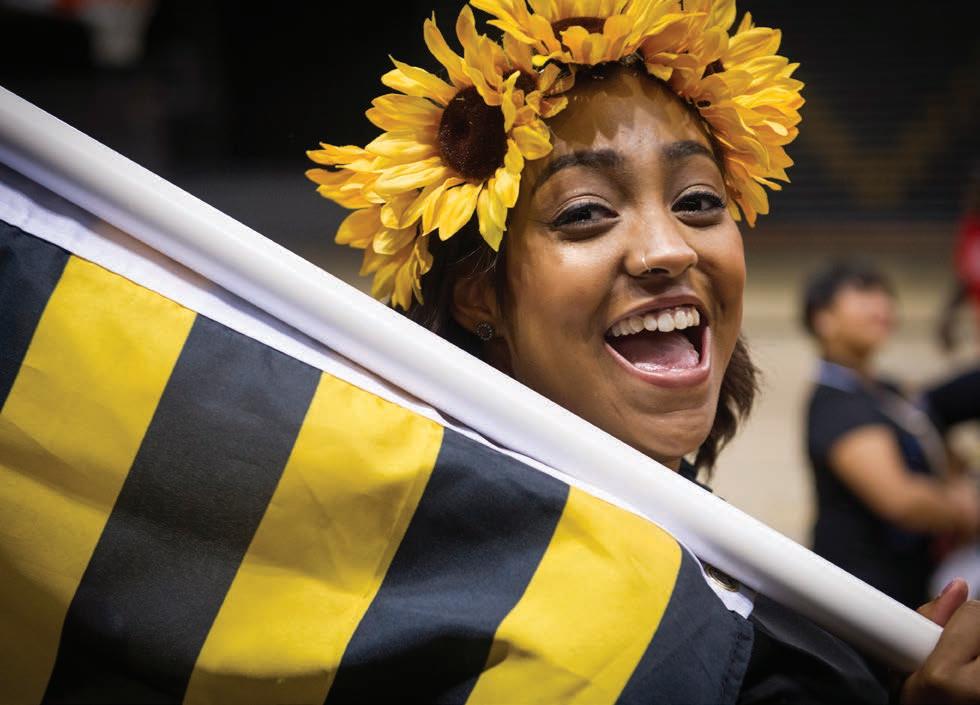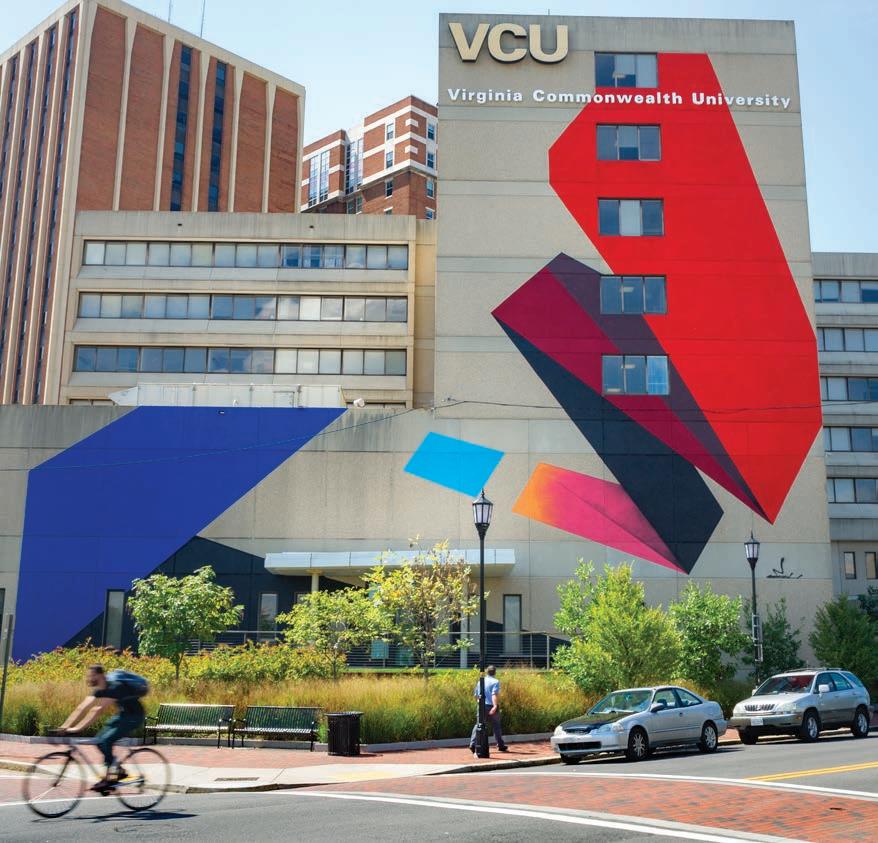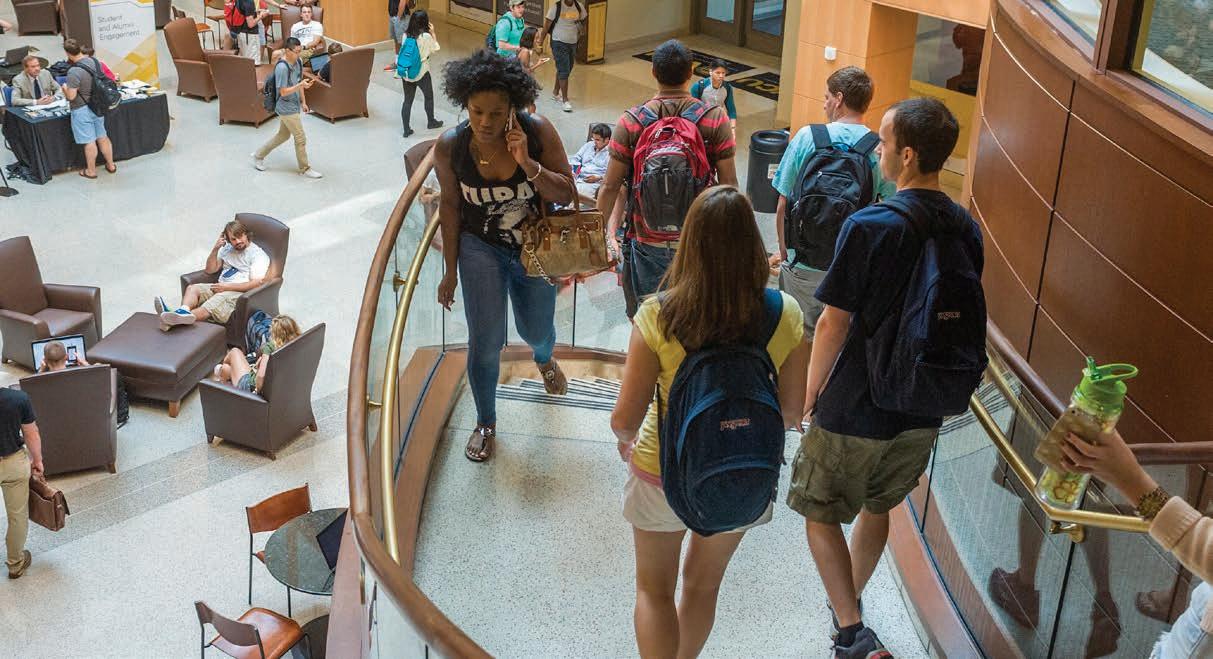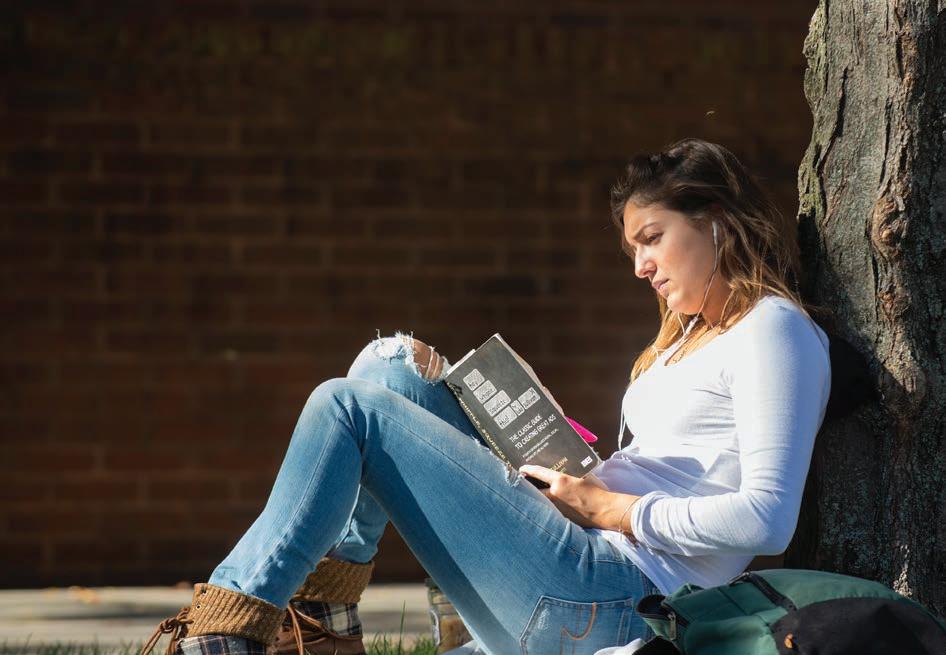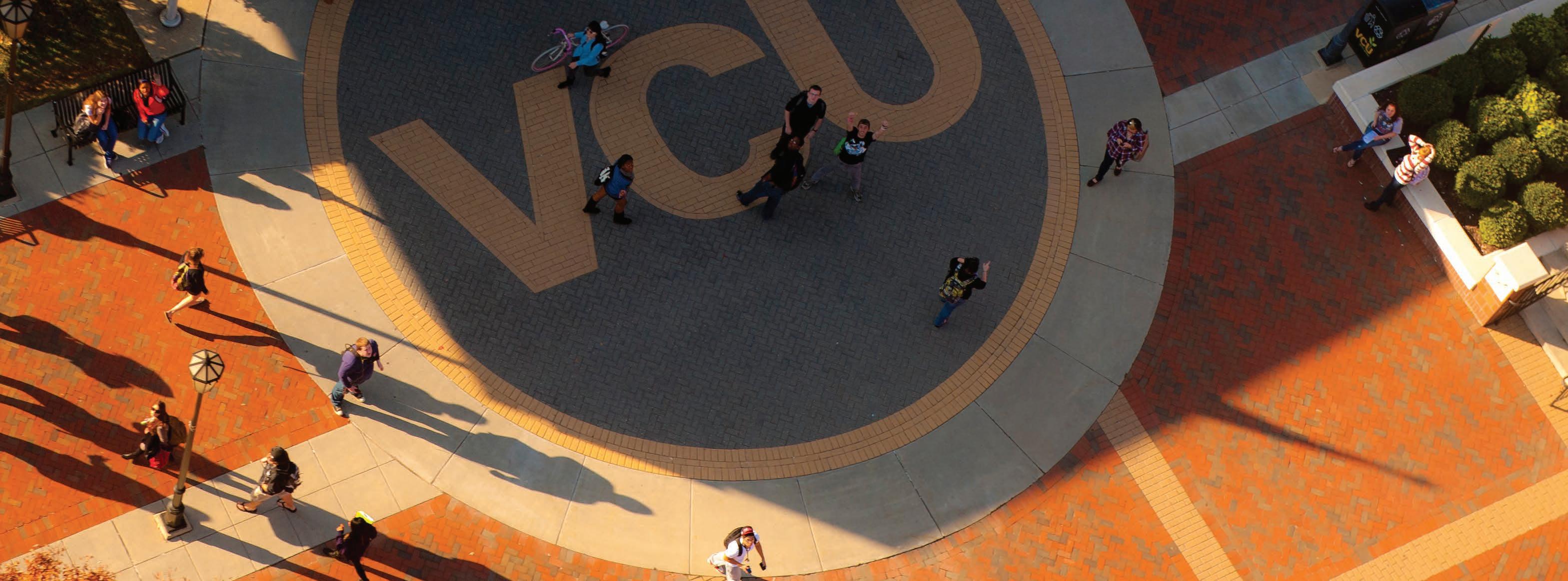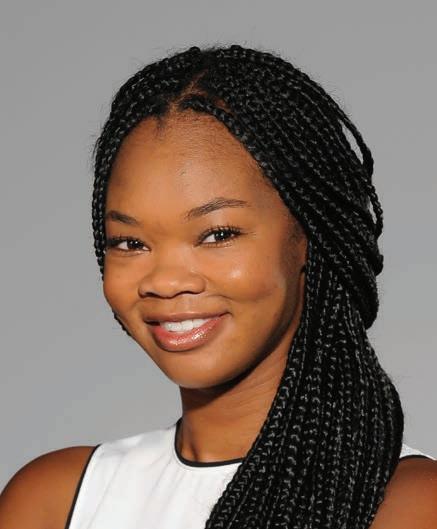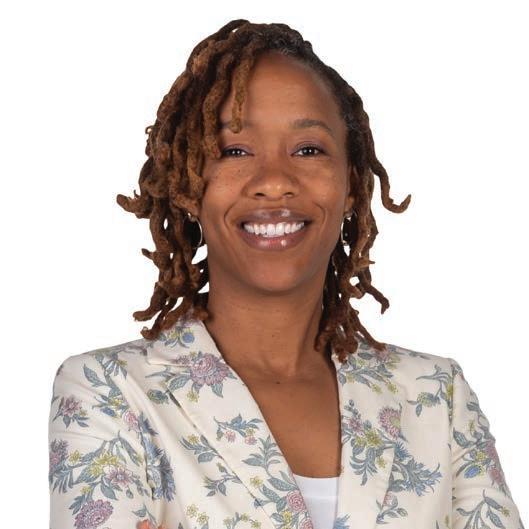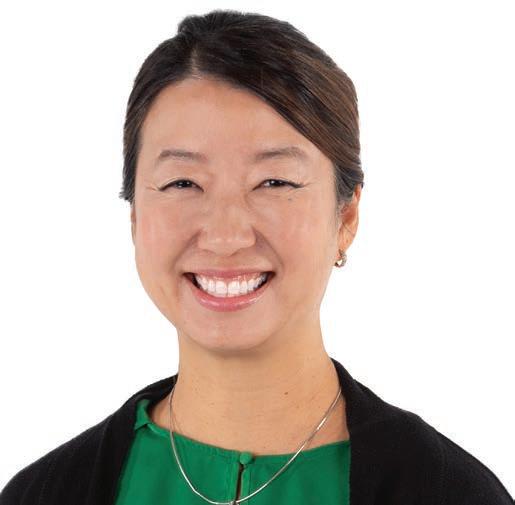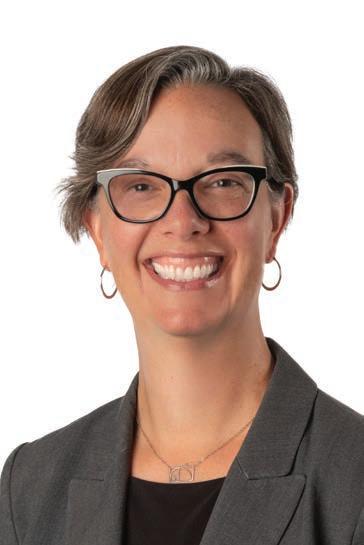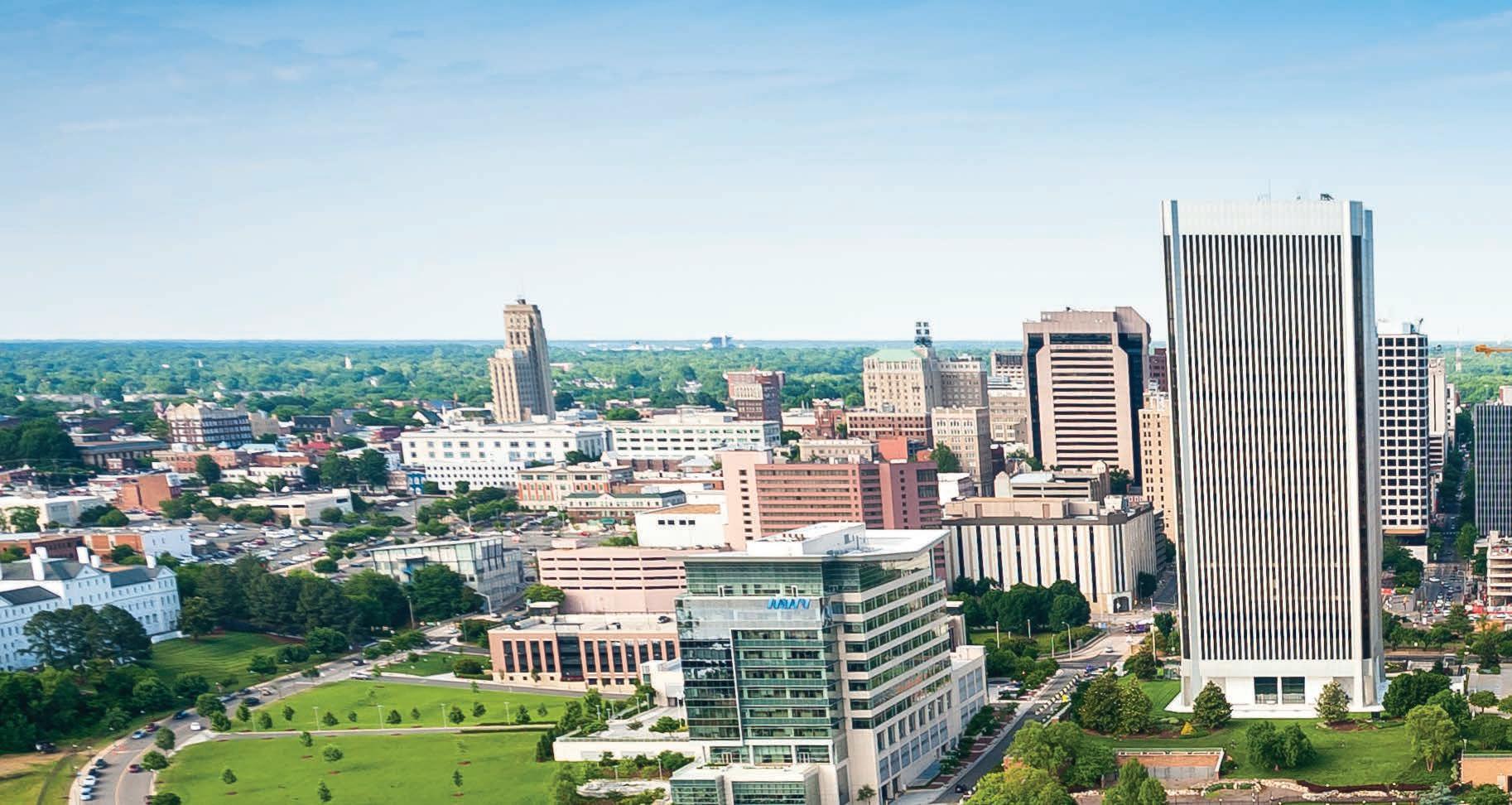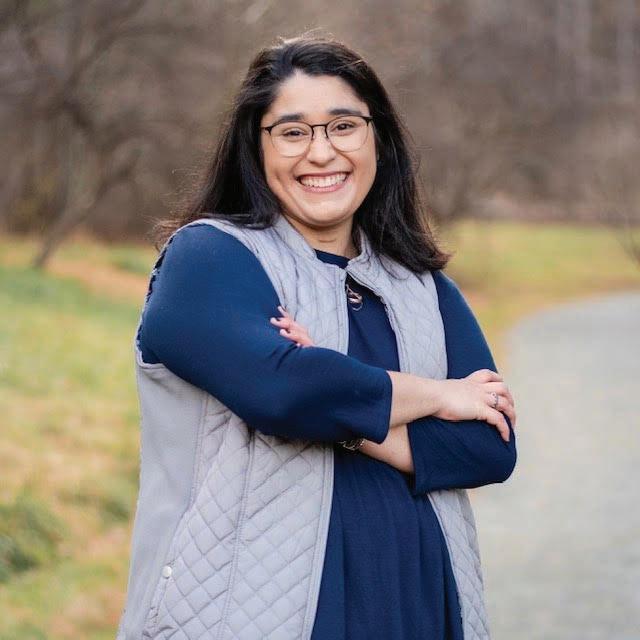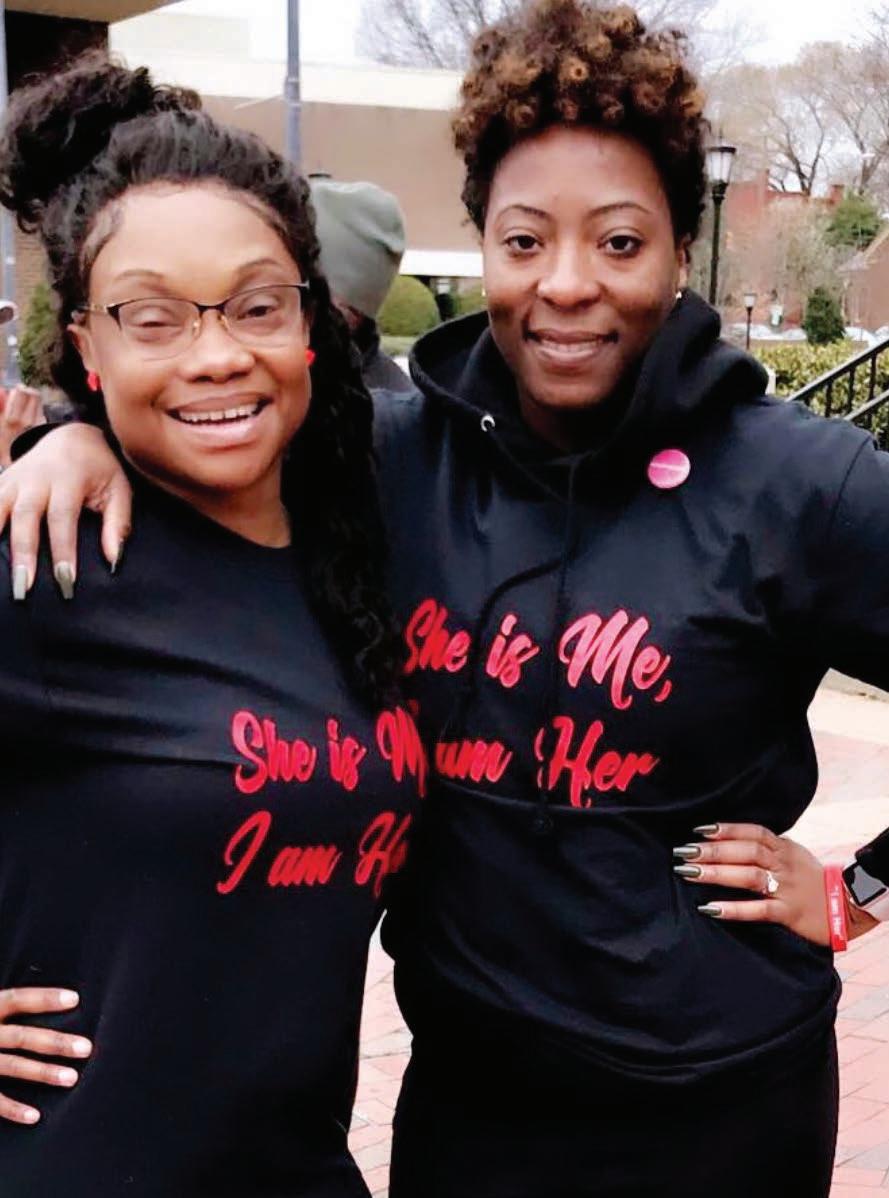VCU SCHOOL OF SOCIAL WORK
MASTER OF SOCIAL WORK DEGREE
PROGRAM DIRECTOR’S WELCOME
The Master of Social Work program at Virginia Commonwealth University provides an environment where students work collaboratively with faculty, staff and community stakeholders to cultivate the professional skill sets needed to intervene with a variety of client systems. Our curriculum is linked to the core competencies for practice developed by the Council on Social Work Education (CSWE) and is grounded within the latest research and knowledge on clinical and macro practice interventions. Our faculty are skilled experts who bring their vast social work practice knowledge into the classrooms and field placements. Ultimately, our goal is to graduate students who will bloom as they impact social change.
We have deep roots. As one of the oldest M.S.W. programs in the South, we have deep roots and a rich legacy of working for social change. Throughout the school’s 100+ year history, we have cultivated extensive relationships with community agencies. These connections have allowed us to provide learning-rich field placements, ones where students learn to implement theories and knowledge into real-world practice environments. Many of our former students remain connected to the M.S.W. Program by becoming adjunct faculty or field instructors.
Our deep roots have allowed us to branch out. The M.S.W. Program is nestled within the city of Richmond; however, our program’s reach is broad and extends far beyond the boundaries of Richmond, Virginia. Our online modality increases accessibility and allows us to engage with diverse students and field agencies throughout the United States. This expands our impact and makes our classroom “limitless.”
Further, our program’s reach is also witnessed by viewing the many contributions of our graduates. In addition to being active in direct clinical or macro practice, many of our graduates hold leadership positions in the organizations in which they work.
In summary, the VCU M.S.W. Program has been a staple of the Richmond community for over a century. This lengthy existence has been the impetus for the M.S.W. Program to be viewed as a valuable member of the community. Our impact is not geographically limited; rather, our contributions to the profession are boundless. We nurture our students, faculty and community partners. The seeds that the M.S.W. Program plants today nourish those who will become successful change agents of tomorrow.
NICOLE LYNN LEE, PH.D. M.S.W. Program director and associate professor
School of
Program is No. 28 in the 2023 U.S. News and World Report rankings for Best Graduate Schools.
The VCU M.S.W. Program: Deep roots, branching arms
The VCU School of Social Work M.S.W. Program is accredited by the Council on Social Work Education’s Commission on Accreditation.
The VCU
Social Work’s M.S.W.
M.S.W. ENROLLMENT BY STATE SPRING 2022
801
Overall enrollment (Fall 2021) AT A
18:1
Student: faculty ratio
AT A GLANCE: 2022 INCOMING CLASSES
American Indian/Alaska Native: 3 (1%)
25
Average class size
46 & above: 33 (8.3%) Race & ethnicity* Age
Asian: 11 (2.8%)
Black/African American: 90 (22.7%)
Hispanic/Latinx: 32 (8%)
International: 9 (2.3%)
Native Hawaiian/Pacific: 2 (1%)
Two or more races: 21 (5.3%)
White: 261 (65.7%)
Unreported: 9 (2.3%)
*Some students are counted in more than one category.
Cisgender men: 28 (7.1%)
Cisgender women: 276 (69.5%)
Exploring: 3 (1%)
Nonbinary: 14 (4%)
Transgender men: 3 (1%)
Unreported: 69 (17.4%)
Not listed identity: 4 (1%)
Under 25: 176 (44.3%)
25-35: 128 (32.2%)
36-45: 60 (15.1%)
ABOUT RICHMOND
VCU is located in Virginia’s capital city, and the School of Social Work is a short distance from the State Capitol, where our students advocate with state legislators in an annual lobby day. The James River flows – and crashes, in sections designated as Class IV whitewater rapids – just blocks south of campus. Our students can participate in whitewater rafting or take advantage of other recreational opportunities in the area through VCU’s Outdoor Adventure Program. Bold murals, galleries, museums, restaurants, shopping and diverse neighborhoods create a vibrant and eclectic mosaic where campus and city blend.
MASTER OF SOCIAL WORK PROGRAM DETAILS
Students from a variety of undergraduate majors pursue the Master of Social Work degree. For those with a Bachelor of Social Work degree, the M.S.W. expands the base of knowledge with more intensive field education, research and writing. Job opportunities, particularly in mental health settings, and earning potential increase with the M.S.W.
Part- and full-time tracks span 16 months to four years for completion of the 60 credit hours. B.S.W. degree holders who meet certain requirements may apply for an advanced standing format of 42 hours over one year.
The first-year generalist curriculum features courses in social work practice; human behavior; social policy; power, privilege and oppression; research; and field education. The second year, students select a specialization: 1) clinical practice, aimed at careers like therapist or counselor; or 2) social work administration, planning and policy practice, a macro-focused track.
Advanced standing students’ accelerated curriculum includes a semester of four “bridge” courses and two semesters of specialization.
STUDENT SUCCESS SUPPORTS
• Student success staff remain in your corner throughout your academic journey, from the moment you express interest in one of our programs all the way to graduation.
• Student success advisors empower and help students navigate the VCU community.
• Student ambassadors engage with prospective students and answer questions as only a current student can.
• Students connect through special interest workshops, make lasting friendships and build professional networks through our student associations.
FIELD EDUCATION
Students in 60-hour regular standing tracks have two field placements, at separate agencies, totaling the 900 hours required by our national accrediting organization, the Council on Social Work Education. Students in the 42-hour advanced standing track have one placement totaling 750 hours.
In both cases, students meet the 600 hours of clinical specialization field requirements needed to start the licensure process through the Virginia Board of Social Work toward the
LCSW.* The VCU M.S.W. curriculum satisfies the requirements for licensure or certification in all U.S. states and territories, including the District of Columbia.
In field education, students are supported by a field instructor who teaches current social work practice and supervises them for at least one hour a week in a local community agency. In addition, faculty field liaisons empower students to bridge their classroom education and their field education through a concurrent, experiential model of learning. Both instructors and liaisons are social workers who hold the M.S.W. degree.
*3,000 hours of post-master's clinical social work practice is also required to receive your LCSW, typically in a full-time work setting.
WHY WE ARE THE BEST
Top-ranked in Virginia and 28th nationally by U.S. News and World Report
$18,145 is the average financial aid award for social work students seeking assistance (2019-20).
18:1 student to faculty ratio 86% first-time licensure passage rate (2020)
MASTER OF SOCIAL WORK COMPARE OUR PROGRAMS
¹Asynchronous classes are all online and completed on your own time.
Each course has three live synchronous classes per course a semester.
²24-month option only available for Fall program starts.
³All field placements are in-person internships at an agency in the student’s community.
⁴Social Work Administration, Planning and Policy Practice.
⁵The SWAPPP specialization will be available online starting in Fall 2023 in the regular standing format in specific curriculum tracks.
CERTIFICATION, CERTIFICATES & DUAL DEGREES
Students may combine their M.S.W. study with additional educational programs, including a certification* in school social work through the Virginia Department of Education; certificates* in aging studies, gender violence intervention and nonprofit management in partnership with other VCU programs; and dual degrees** of M.S.W. and Juris Doctor (University of Richmond), M.S.W. and Master of Divinity (Virginia Union University) and M.S.W. and Master of Public Health (VCU).
*Only the school social work certification (tracks supporting fall/spring placements); and nonprofit management and aging studies certificates are available to online students.
**Students must apply and be accepted to each program for a dual degree. Only available to on-campus students.
ADMISSION DETAILS
See the table on the opposite page about all the available program formats for the M.S.W. Program. Detailed admission requirements are on the school website.
To apply, you’ll need:
• Completed online application
• Statement of intent
• Three academic and/or professional recommendation letters
• Official transcripts
• C grade or above in both a three-credit behavioral science and a three-credit social science course
• Detail of human/social service-related job experience (optional)
• For advanced standing, you will also need:
• 3.0 minimum GPA in B.S.W. degree
• Case assessment
• B or better (or pass) in senior field placement; check the website for updates to this requirement.
SCHOLARSHIPS & FINANCIAL AID
The School of Social Work has around two dozen scholarships designated just for M.S.W. students, and numerous graduate scholarship opportunities are available through VCU and state/national sources.
Through the Child Welfare Stipend Program at VCU, a partnership with the Virginia Department of Social Services, both B.S.W. and M.S.W. students can apply for a $10,000 stipend each academic year, for up to two years. Students receive child welfare training and in return commit to work in Virginia in child welfare at a local DSS agency, one year for each year they are in the program. The CWSP at VCU is available to online students, but is dependent on the track, duration and term start.
Yearlong research assistantship positions provide stipend and tuition assistance to incoming full-time M.S.W. students. These highly competitive positions include a rewarding and educational service component. Previous assistantships have provided students the opportunity to engage in faculty-led research and develop faculty mentoring relationships.
• 50+ - scholarships and graduate assistantships awarded to M.S.W. student annually for financial support
• 77.1% - students who received financial aid at the School of Social Work in 2019-20
MASTER OF SOCIAL WORK FACULTY & RESEARCH
BY THE NUMBERS
40+ Full-time school faculty
70+ Adjunct M.S.W. faculty
VCU social work faculty are nationally recognized for their research and expertise, and they teach across all programs. Our adjunct faculty and field instructors are all professional social workers whose perspectives are informed by their life and work experiences.
Supporting the profession’s need for evidence-based practice and policy, multiple social work faculty conduct research in the following topics, among others:
• adolescent and youth development
• child welfare
• gender
• health
• inequality, poverty and social welfare policy
• international social work and global issues
• mental health
• race and ethnicity
• sexual orientation and gender identity
• social work education
• substance misuse and addictive behaviors
• violence against women and children
FACULTY HIGHLIGHTS
Take a closer look at some of our faculty who teach in the M.S.W. Program
Jamie Cage (she/her), Ph.D.
Assistant professor
Nicole Corley (she/her), Ph.D.
Assistant professor
Drs. Cage and Corley are part of an interdisciplinary team of VCU researchers focused on disrupting criminalization in education. They explore how the criminalization of trauma and exclusionary discipline are used as barriers to educational excellence among Black and Latinx children.
The two are co-investigators of the team’s federally funded project, “Disrupting the Trauma-to-Prison Pipeline for Girls in Virginia.” The team:
• Introduced new prevention programming into state detention and community-based diversion facilities
• Implemented trauma-to-prison pipeline training for juvenile justice staff in Virginia
• Improved community resources in high-poverty areas
“The criminalization of trauma experienced by Black girls contributes to their disproportionate involvement in the juvenile justice system,” Dr. Cage says. “Black girls experience trauma at the individual, system and community/structural levels. We aim to disrupt their experiences with trauma and the ways that such trauma is criminalized.”
Hollee McGinnis (she/her), Ph.D. Assistant professor
Questioning her identity as a transracial adoptee from South Korea led Dr. McGinnis to explore the topic in her undergraduate thesis. It’s continued to shape her work as a social work practitioner and academic.
She first created an organization for adult intercountry adoptees, Also-Known-As, building a network of mentors to help new families of adoptees.
“I grew up during a time when adoption practitioners encouraged a ‘colorblind’ approach without recognizing the challenges of growing up as a racial minority in the U.S,” says Dr. McGinnis. “I thought about how helpful it would have been to connect with others who shared my complex family.”
She has received a prestigious VCU research award to explore how adult adoptees and alumni of foster care develop connections that promote mental health and well-being.
“This study will build knowledge on how connections with peers with a shared lived experience may be a resource for adult adoptees and foster care alumni. Findings from this study could also be used to reshape the child welfare system,setting youth up for thriving adulthoods.”
Alex Wagaman (she/her), Ph.D. Associate professor
Dr. Wagaman is an expert on issues of youth homelessness and housing instability. But she also knows the limitations of her expertise and the importance of lived experience.
That is why much of her work is collaborative with those who have experienced homelessness and/or evictions. She focuses on participatory research, and collaborates with Advocates for Richmond Youth (ARY), a participatory action research team working to end youth homelessness.
Dr. Wagaman has also partnered with VCU’s Eviction Lab and community organizations to help facilitate youth-led research. Teams of youth researchers conducted and presented their findings on eviction and housing instability at an event for the VCU and Richmond communities.
Dr. Wagaman was part of a team that helped secure one of 10 national spots for Greater Richmond to participate in the Grand Challenge to End Youth Homelessness, specifically working on solutions for LGBTQ+ youth and youth of color.
“If you can successfully support LGBTQ+ youth and youth of color – two populations who face some of the most marginalization –then everybody is going to benefit,” Dr. Wagaman says.
WHERE YOU FIND SOCIAL WORKERS
Social workers can be found working with individuals, families and communities across a variety of settings.
MENTAL HEALTH
• Behavioral health facilities
• Correctional institutions
• Employee assistance programs
• Hospitals and rehabilitation programs
• Military and veterans affairs
HEALTH CARE
• Hospitals and clinics
• Public health programs
• Primary, long-term and nursing care facilities
• Psychiatric and substance misuse facilities
• Government agencies and schools
• Nonprofits
• Research organizations
• Government agencies
• Political campaigns COMMUNITY SETTINGS
• Community and religious organizations
• Private practice
• Courts, schools, hospitals and clinical settings WORKING WITH FAMILIES
“VCU was a school I had my eye set on since I was in high school. I never lost sight of the possibilities of what VCU had for me to explore. The M.S.W. Program provided an environment where my lived experience was appreciated and utilized to challenge policy, practice and engagement strategies with children, youth and families. The M.S.W. Program and CWSP provide students who are eager and ready to be changemakers with the preparation and education to gain a greater understanding and practice of advocacy, social and economic justice.”
– Andrea Perez (she/her), 2020 online M.S.W. graduate, family preservation and family finder services worker, Albemarle County (Virginia) Department of Social Services
MASTER OF SOCIAL WORK ALUMNI HIGHLIGHTS
WiIth more than 11,000 living alumni, the VCU School of Social Work has a longstanding presence throughout agencies, organizations and government in the Richmond metro area, the state and the region.
Felicia Bowman Chandler (she/her), LCSW
2017 M.S.W. graduate; behavioral health case manager, Humana; lead therapist/CEO of Soul Guided Healing & Wellness, LLC
Felicia Davis (she/her), LMSW
2017 M.S.W. graduate; travel social worker
Chandler (far right) and Davis were in the same M.S.W. cohort, graduating together in 2017. They reconnected later thanks to their mutual interest in HIV awareness.
“We were both advocating for individuals living with HIV and prevention efforts,” Davis says. “I would see her name as an attendee from time to time, so one day I said, ‘Let’s meet while at the training.’ ”
They previously collaborated for Speak Glamher, a nonprofit Chandler founded to focus on educating and promoting the importance of sexual and mental health for women and girls of color.
“Black and Brown communities of color are at higher risk of experiencing trauma, mental exhaustion, violence and chronic health conditions,” Chandler says. “Black women are at higher risk for being diagnosed with HIV compared to other races. Black women deserve a space where they can be seen, heard and supported during their healing journey.”
Chandler is currently focusing her energy on her private practice, Soul Guided Healing & Wellness, which provides culturally-sensitive mental health therapy for women and girls of color. Davis' focus and compassion are currently split between assisting women with substance use disorder and being a diversity, equity, and Inclusion champion to foster change.
Their bonds remain strong. “We have experienced so many opportunities together since we met,” Chandler says. “It has been a pleasure building a relationship/ sisterhood. I believe your connections can create lifelong friends and professional opportunities.”
View more M.S.W. alumni profiles
